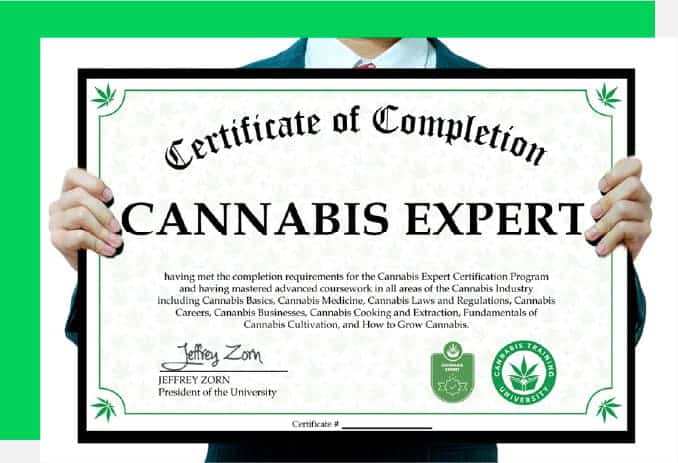We’ve left the golden period where a college degree means a more lucrative future filled with job opportunities and financial security. Fewer would-be college students are walking the path of higher education, often citing financial barriers and a lack of return on investment as reasons for ditching the traditional course of action. After all, student loans now represent the second-largest portion of household debt, only following mortgages. It’s easy to see why someone may opt for a less expensive option, especially when many college graduates end up struggling to find work.
For many would-be students, trade schools, internships, and other forms of hands-on experience are starting to sound like the smarter options. . With the cannabis industry now providing nearly half a million jobs, I found myself wondering, what about cannabis universities and cannabis-specific training schools? Are these pathways more beneficial for adults who want to enter the industry, or are they just another way to throw money at an idea without tangible results?
It’s a big question. And like most paths, diverse experiences make it impossible to land on a single answer. To get a better understanding, I talked to some people involved.
Chatting with a chancellor
If Oaksterdam doesn’t come up in your conversations about cannabis colleges, you’re probably talking to the wrong people. This is the place that started it all–or at least, it’s self-described as the first cannabis college in America. Operating since 2007, this cannabis university’s main campus sat in downtown Oakland until a fire damaged it in 2020. The school was already operating virtually in response to the pandemic, and continues to do so.
Students at Oaksterdam University can enroll in certificate courses in horticulture, business, budtending, and extracts and manufacturing. The courses are taught by experienced cannabis cultivators, business owners, and advocates.
I spoke with Dale Sky Jones, the Executive Chancellor at Oaksterdam. She told me that students must meet certain attendance requirements and pass within 80 percent or greater on their final exam in order to leave with full certification. Nobody leaves with a degree–instead, they come out of Oaksterdam with full certification in their chosen course of study.
Before graduating, students create a business plan to prepare for the future. This involves attending classes, as well as meeting with a cohort of coaches and presenting a final project in front of their class and a host of industry judges.
But how do these Oaksterdam courses translate into real-world skills and do they improve a student’s chance at getting a job in the cannabis industry?
“The people that present the best plan overall in each of the cohorts get extra accolades, including a letter of recommendation from me and a few other things that would be helpful in getting a job,” said Sky Jones.
Some might think that a cannabis college is just a money grab, but it’s hard to deny Oaksterdam’s role in scoring industry jobs when you look at some of its notable alumni. “Legal King of Weed” Shawn Richard attended Oaksterdam before launching the first cannabis dispensary in San Francisco’s Upper Haight neighborhood. Before operating in the legal space, Richard was selling weed in San Francisco’s illicit market.
“And I joke with him, I want an asterisk on the legal part, because that was Oaksterdam. He was already the king of cannabis on Haight Street,” Sky Jones told me with a laugh. “He already knew how to run his business, but it was how to run the consultants, how to hone his bullshit detector, how to know the different aspects so that he could run his business rather than letting his business run him.”
She also pointed to the success story of Tucky Blunt, who attended Oaksterdam before opening the first social equity-owned dispensary in California, Blunts + Moore.
Beyond its job board, students at Oaksterdam also get to interact with potential employers through the networking opportunities the school provides. “We have a lot of different subject matter experts, some faculty, some instructors and some coaches. A lot of times, the networking is what brings the job interactions,” explained Sky Jones. “So you have a coach come in who is working with a bunch of different groups and some naturally rise to the top, and then they’re offered a job.”
While talking with Dale Sky Jones, it became apparent to me that Oaksterdam cultivates an environment ripe for networking and skill sharing. There is no doubt that students who apply themselves will come out of the school with more skills than they came in with, and there’s a good chance they’ll meet people who can help them grow their career and land a job in the industry. It’s certainly not the only way to get a job in cannabis, but if you have the means to take their courses, you’re sure to come out looking better to employers than you did going in. But how much better?
What do employers think about cannabis certificates?
Higher Growth Search is a staffing and employment solution company focused on the cannabis industry. The company helps cannabis businesses fill temporary and direct hire roles across entry-level, professional, and C-suite positions. I spoke to their managing director, Stacy Bryant, to get a better idea of how cannabis education credentials impact hiring decisions. We discussed cannabis education in general, not focusing on any one school or training course.
“It’s beneficial because people have some understanding of the industry. But to be honest, real experience is always better,” she told me. “The courses are relevant…Candidates would have a higher advantage at being hired versus somebody that doesn’t have any experience or any sort of background.”
Bryant explained that hands-on experience is typically preferred, though she noted that different education courses can provide such background. But it doesn’t appear that taking a cannabis growing class would have better results than, say, working at a grow facility for a year and gaining experience that way. The two experiences may render similar results, and in the end, it may come down to other factors.
The specific path someone is considering is important too. Working at a grow facility may help you network and gain experience, but it’s not necessarily going to provide you with the concrete business skills you need to launch your own brand, for example. In that case, a cannabis business education may prove more useful than hands-on experience.
“When we’re presenting resumes to clients and they’re deciding which candidates they want to interview, the ones that have experience or cannabis-specific education, in my opinion, are the ones that are going to end up getting chosen,” Bryant told me, before adding that it’s not always just about who has what on their resume. Of course, experience in certain capacities is important, but that’s not all employers are looking for. “Most of the time, there’s a lot of people that are equally qualified on paper, and it comes down to a personality match.”
Bryant shared how the market is evolving, and how increasing regulations have impacted the hiring process. With more oversight comes more need for cannabis-specific skill sets, meaning employers are going to look for people who have a proven track record of industry understanding.
“There’s a lot of really excited people and there’s a lot of really great candidates that have good traditional backgrounds but don’t necessarily have that cannabis-specific knowledge or a specific skill set that’s really needed,” she explained. “There’s just not enough candidates for all of the jobs out there. And there’s a lot of jobs that are really good jobs, unfortunately, people are just not qualified for them.”
So are cannabis certification programs worth it?
When it comes down to it, any experience is better than nothing. If you have the opportunity to get your hands dirty and climb your way to the top, employers are likely to see it as a positive. Most employers aren’t seeking someone with cannabis-specific education credentials, but their inclusion on a resume still looks good. If you don’t have any background in cannabis, those credentials may be the key to landing your first industry job. Plus, the networking opportunities that cannabis schools may provide could also be instrumental in building a cannabis career.
Credentials from reputable cannabis schools are by no means a requirement for an industry job. But they can signal to employers that you’re serious about landing a role in the evolving industry. And if it comes down to two candidates–one with no cannabis experience and one with a certificate from a cannabis school–the one who has studied the industry is probably going to come out on top. Of course, as Bryant emphasized, other factors, like personality matches are important when it comes to hiring candidates.
I spoke with Matthew Overcast, COO of Show-Me Natural Gardens, who earned a certificate from Cannabis Training University in 2019. He is certified in all areas offered, including growing, cooking, extracting, laws and regulations, budtending, business training, delivery services, and more. With his broad set of credentials, I wanted to see how much value he felt he gained from his certification.
“Their courses, at least at the time I took it, were good if you had no industry knowledge as a nice starting place. However, if you have any work experience as a commercial participant in the industry or even an experienced caregiver, you likely know as much as their subject matter experts,” he told me, adding “I still think formal education is better than nothing.”
His advice for considering students? “A degree related to the specific industry (i.e. plant science and botany for cultivation) is a good start and makes you more versatile. To complement that, do your best to secure an entry-level plant-touching job, dive in, and learn everything you can. A lot of these employed industry participants have been doing it for a while, pre-decriminalization, and are more than willing to take on apprentices. It’s all about networking.”
If there’s one thing I learned from these discussions, it’s that employers value knowledge and experience. An industry job comes with responsibility, and you are going to need to showcase why you would be a good, valuable fit for a company. In some cases, cannabis education credentials could be the perfect sell. In others, that hands-on, real-world experience is deemed more valuable. Education credentials don’t appear to hurt in any situation, but alone, they might not be enough to win an employer over.






10 thoughts on “To degree or not to degree: Is cannabis education worth your time?”
Pingback: Another move toward mainstream: Nancy Whiteman shares her wisdom with graduates - MJ Brand Insights
Pingback: How to Get Cannabis License: 5 Licenses
Pingback: How to Get Cannabis License: 5 Licenses | Embroker - Orlando News Station
Pingback: How to Get Cannabis License: 5 Licenses | Embroker
Pingback: Get Hashish License: 5 Licenses
Pingback: How to Get Cannabis Licenses: 5 Types – Insurance News Hubb
Pingback: How To Get Cannabis Licenses: 5 Types - World Wide News Network
Pingback: How to Get Cannabis Licenses: 5 Types – Fintech News Hubb
Pingback: How to Get the Right Cannabis Licenses for Your Business - Independent Insurance Agency Academy
Pingback: How to Get the Right Cannabis Licenses for Your Business - US Insurance Quotes